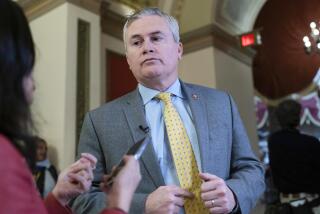Tobacco Ally Demands Industry Papers
- Share via
In a surprising turn of events, the leading supporter of the tobacco industry on Capitol Hill demanded Thursday that the cigarette companies turn over more than 800 confidential documents, declaring he will subpoena the papers if the industry does not comply voluntarily.
Rep. Thomas J. Bliley (R-Va.), chairman of the House Commerce Committee, made the demand at the start of the first House hearing on proposed national tobacco legislation. His stance puts him on the same footing as liberal Democrats in the Senate who have made similar demands that have been resisted by the industry, and they immediately applauded the move. So did Secretary of Health and Human Services Donna Shalala; Minnesota Atty. Gen. Hubert H. Humphrey III, whose case against the industry is scheduled to go to trial in January; and Rep. Henry A. Waxman (D-Los Angeles), the industry’s leading critic in the House.
Both J. Phil Carlton, a North Carolina lawyer who represented the industry in negotiations leading up to the settlement, and Lance Morgan, a Washington spokesman for the companies, said they would not comment until they had received a formal written request for the documents from Bliley.
Tobacco analyst Gary Black of Sanford C. Bernstein & Co. in New York dismissed Bliley’s move as an attempt to publicly establish his independence from the industry.
“It’s a way of making yourself look tough,” Black said. “This is the opposite of Teddy Roosevelt--speak loudly and carry a little stick.”
Another analyst said Bliley’s action is a sign of how much tobacco’s fortunes have eroded in Congress.
“I think you’re starting to see some of these guys [traditional tobacco allies] go into a defensive posture” because the industry is so vilified, said Joe Lieber, political analyst for HSBC Securities in Washington.
Bliley, who has accepted more campaign contributions from the industry than any other member of Congress, called on the cigarette companies to relinquish 834 internal documents that a special master in Minnesota’s case has ruled are not covered by the attorney-client confidentiality privilege “because they evidence the commission” of a crime or fraud. The industry has appealed that decision.
“Under the proposed tobacco settlement between state attorneys general and the tobacco industry, the documents will not see the light of day until after Congress approves the agreement. This cannot stand,” Bliley said. “If the tobacco industry engaged in criminal or fraudulent activities, then Congress has a right--a duty--to know before legislation is enacted granting that industry any form of immunity against lawsuits.”
Bliley’s announcement noted that the committee has not attempted to subpoena documents in the three years that he has been its chairman.
Philip Morris Cos., the nation’s leading cigarette manufacturer, has one of its largest manufacturing facilities in Bliley’s district, employing several thousand people. Until Thursday, Bliley had been circumspect in commenting on the proposed $368.5-billion national settlement, which was reached in June and is expected to be fully reviewed by Congress next year.
In return for paying out the money and agreeing to restrictions on its marketing and advertising practices, the industry would be immunized from class-action lawsuits and punitive damages in the future.
“Complete and unfettered disclosure of the facts should be a critical component of any tobacco proposal considered by Congress, and the will and voices in Congress for full disclosure is fully growing,” said Sen. Patrick J. Leahy (D-Vt.).
On Sept. 25, Leahy and five other members of the Senate Judiciary Committee made a similar request to the cigarette companies. The industry declined, saying that complying with the request would constitute a waiver of its claims of privilege over the documents in court.
The documents at issue are among more than 2,400 that Liggett turned over--under seal--to courts in 22 states in late March after it settled suits filed against it by attorneys general from those states. The nation’s other cigarette companies immediately asserted that they were entitled to keep the documents secret on grounds of attorney-client privilege. Litigation is pending in several states on the matter.
Thus far, only eight of the documents have been released, in Florida, after the industry lost all its appeals there. Those documents were not particularly explosive, prompting Black to speculate that the ones Bliley asked for would not prove very important.
But Humphrey stressed Thursday that “the 834 Liggett documents are just the tip of the iceberg when it comes to exposing this industry’s fraud and conspiracy.” Minnesota is battling to get unsealed more than 150,000 other documents that the industry is trying to keep secret.
“Congress and the American public need to know what the tobacco industry concealed for 40 years: the truth about manipulating nicotine, manipulating kids, manipulating public policy and conspiring to stifle development of safer cigarettes,” Humphrey said.
New York University law professor Stephen Gillers said the attorney-client privilege applies in congressional hearings as well as in court, subject to the same “crime-fraud” exception. He said Congress generally has accepted claims of attorney-client privilege but on some occasions has gone to court seeking to obtain documents when a party resisted turning them over on such grounds.
*
Times staff writer Myron Levin contributed to this report.
More to Read
Get the L.A. Times Politics newsletter
Deeply reported insights into legislation, politics and policy from Sacramento, Washington and beyond. In your inbox twice per week.
You may occasionally receive promotional content from the Los Angeles Times.







